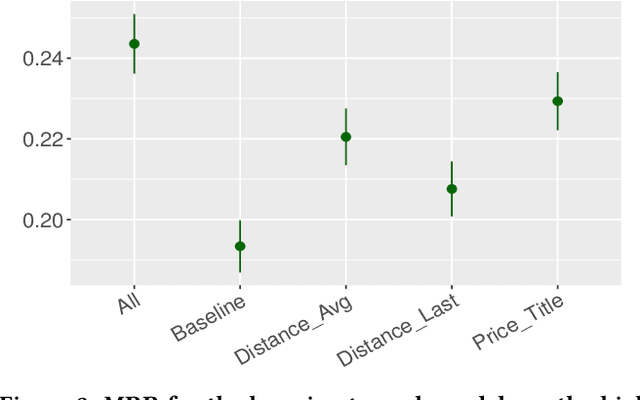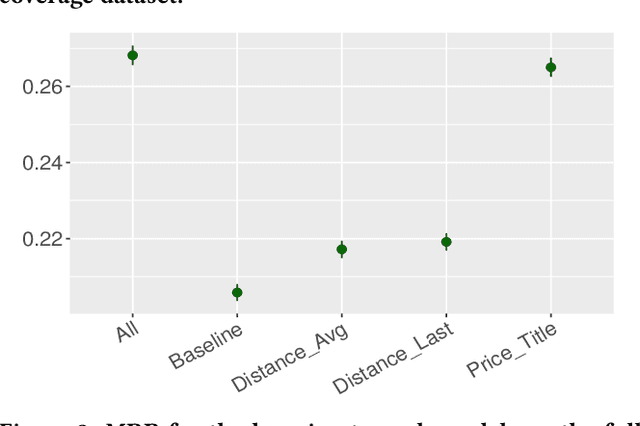Aritra Mandal
Bridging Modality Gaps in e-Commerce Products via Vision-Language Alignment
Aug 13, 2025Abstract:Item information, such as titles and attributes, is essential for effective user engagement in e-commerce. However, manual or semi-manual entry of structured item specifics often produces inconsistent quality, errors, and slow turnaround, especially for Customer-to-Customer sellers. Generating accurate descriptions directly from item images offers a promising alternative. Existing retrieval-based solutions address some of these issues but often miss fine-grained visual details and struggle with niche or specialized categories. We propose Optimized Preference-Based AI for Listings (OPAL), a framework for generating schema-compliant, high-quality item descriptions from images using a fine-tuned multimodal large language model (MLLM). OPAL addresses key challenges in multimodal e-commerce applications, including bridging modality gaps and capturing detailed contextual information. It introduces two data refinement methods: MLLM-Assisted Conformity Enhancement, which ensures alignment with structured schema requirements, and LLM-Assisted Contextual Understanding, which improves the capture of nuanced and fine-grained information from visual inputs. OPAL uses visual instruction tuning combined with direct preference optimization to fine-tune the MLLM, reducing hallucinations and improving robustness across different backbone architectures. We evaluate OPAL on real-world e-commerce datasets, showing that it consistently outperforms baseline methods in both description quality and schema completion rates. These results demonstrate that OPAL effectively bridges the gap between visual and textual modalities, delivering richer, more accurate, and more consistent item descriptions. This work advances automated listing optimization and supports scalable, high-quality content generation in e-commerce platforms.
Semantic Equivalence of e-Commerce Queries
Aug 07, 2023
Abstract:Search query variation poses a challenge in e-commerce search, as equivalent search intents can be expressed through different queries with surface-level differences. This paper introduces a framework to recognize and leverage query equivalence to enhance searcher and business outcomes. The proposed approach addresses three key problems: mapping queries to vector representations of search intent, identifying nearest neighbor queries expressing equivalent or similar intent, and optimizing for user or business objectives. The framework utilizes both surface similarity and behavioral similarity to determine query equivalence. Surface similarity involves canonicalizing queries based on word inflection, word order, compounding, and noise words. Behavioral similarity leverages historical search behavior to generate vector representations of query intent. An offline process is used to train a sentence similarity model, while an online nearest neighbor approach supports processing of unseen queries. Experimental evaluations demonstrate the effectiveness of the proposed approach, outperforming popular sentence transformer models and achieving a Pearson correlation of 0.85 for query similarity. The results highlight the potential of leveraging historical behavior data and training models to recognize and utilize query equivalence in e-commerce search, leading to improved user experiences and business outcomes. Further advancements and benchmark datasets are encouraged to facilitate the development of solutions for this critical problem in the e-commerce domain.
ORDSIM: Ordinal Regression for E-Commerce Query Similarity Prediction
Mar 13, 2022



Abstract:Query similarity prediction task is generally solved by regression based models with square loss. Such a model is agnostic of absolute similarity values and it penalizes the regression error at all ranges of similarity values at the same scale. However, to boost e-commerce platform's monetization, it is important to predict high-level similarity more accurately than low-level similarity, as highly similar queries retrieves items according to user-intents, whereas moderately similar item retrieves related items, which may not lead to a purchase. Regression models fail to customize its loss function to concentrate around the high-similarity band, resulting poor performance in query similarity prediction task. We address the above challenge by considering the query prediction as an ordinal regression problem, and thereby propose a model, ORDSIM (ORDinal Regression for SIMilarity Prediction). ORDSIM exploits variable-width buckets to model ordinal loss, which penalizes errors in high-level similarity harshly, and thus enable the regression model to obtain better prediction results for high similarity values. We evaluate ORDSIM on a dataset of over 10 millions e-commerce queries from eBay platform and show that ORDSIM achieves substantially smaller prediction error compared to the competing regression methods on this dataset.
* 9 pages
Personalized Ranking in eCommerce Search
Apr 30, 2019



Abstract:We address the problem of personalization in the context of eCommerce search. Specifically, we develop personalization ranking features that use in-session context to augment a generic ranker optimized for conversion and relevance. We use a combination of latent features learned from item co-clicks in historic sessions and content-based features that use item title and price. Personalization in search has been discussed extensively in the existing literature. The novelty of our work is combining and comparing content-based and content-agnostic features and showing that they complement each other to result in a significant improvement of the ranker. Moreover, our technique does not require an explicit re-ranking step, does not rely on learning user profiles from long term search behavior, and does not involve complex modeling of query-item-user features. Our approach captures item co-click propensity using lightweight item embeddings. We experimentally show that our technique significantly outperforms a generic ranker in terms of Mean Reciprocal Rank (MRR). We also provide anecdotal evidence for the semantic similarity captured by the item embeddings on the eBay search engine.
 Add to Chrome
Add to Chrome Add to Firefox
Add to Firefox Add to Edge
Add to Edge